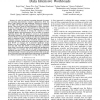Free Online Productivity Tools
i2Speak
i2Symbol
i2OCR
iTex2Img
iWeb2Print
iWeb2Shot
i2Type
iPdf2Split
iPdf2Merge
i2Bopomofo
i2Arabic
i2Style
i2Image
i2PDF
iLatex2Rtf
Sci2ools
110
click to vote
CCGRID
2009
IEEE
2009
IEEE
Markov Model Based Disk Power Management for Data Intensive Workloads
—In order to meet the increasing demands of present and upcoming data-intensive computer applications, there has been a major shift in the disk subsystem, which now consists of more disks with higher storage capacities and higher rotational speeds. These have made the disk subsystem a major consumer of power, making disk power management an important issue. People have considered the option of spinning down the disk during periods of idleness or serving the requests at lower rotational speeds when performance is not an issue. Accurately predicting future disk idle periods is crucial to such schemes. This paper presents a novel disk-idleness prediction mechanism based on Markov models and explains how this mechanism can be used in conjunction with a three-speed disk. Our experimental evaluation using a diverse set of workloads indicates that (i) prediction accuracies achieved by the proposed scheme are very good (87.5% on average); (ii) it generates significant energy savings over th...
Related Content
| Added | 20 May 2010 |
| Updated | 20 May 2010 |
| Type | Conference |
| Year | 2009 |
| Where | CCGRID |
| Authors | Rajat Garg, Seung Woo Son, Mahmut T. Kandemir, Padma Raghavan, Ramya Prabhakar |
Comments (0)

